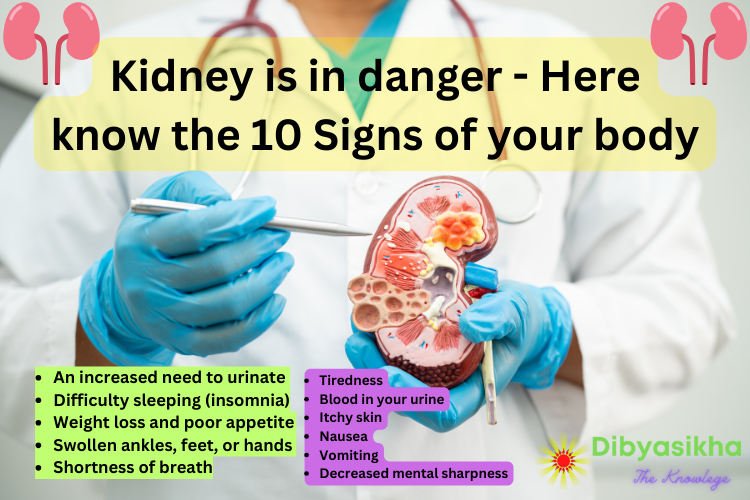If your kidney is in danger, the body will give you these 10 signs. Filtering 10–15–0 pints of blood a day, the kidneys are vital to your health since they purify and cleanse the body.
They are situated beneath the ribs. They help your body get rid of extraneous and superfluous fluids, balance electrolyte levels, make more red blood cells, control blood pressure, and maintain strong, healthy bones. The entire population’s health is at risk if they are endangered or impeded. Because of this, it’s critical to understand how to recognize the symptoms your body sends out to let you know when kidney damage or failure is present.
What are the first signs of kidney disease
In general, stages 1 through 3 refer to earlier ones. Additionally, when kidney disease worsens, you can experience the symptoms listed below. Shortness of breath, dry, itchy skin, cramping in the muscles, loss of appetite, swelling in the feet and ankles, difficulty sleeping, and excessive or insufficient urination. Urination Changes – the most common early symptoms of kidney damage.
- An increased need to urinate, especially at night
- Difficulty sleeping (insomnia)
- Weight loss and poor appetite
- Swollen ankles, feet, or hands due to water retention
- Shortness of breath
- Tiredness
- Blood in your urine
- Itchy skin
- Nausea
- Vomiting
- Decreased mental sharpness
Here are some symptoms of Chronic Kidney Disease (CKD)

- Bad Concentration and Dizzines –Insufficient oxygen in the brain can cause severe anemia or kidney failure, which can worsen concentration and focus and cause lightheadedness, memory problems, and dizziness.
- Skin Rashes – Waste deposits may also cause renal failure, which would explain the skin’s itching and rashy appearance. The accumulation of waste in the blood causes the skin to seem unhealthy, with dry and itchy patches. Lotions and creams can help with this to some extent, but treating the fundamental issue is what’s really needed.
- Bearing all of this in mind, It is crucial to take good care of your kidneys by eating foods strong in antioxidants, taking supplements, and drinking enough water. This will promote overall health, avoid any difficulties of this nature, and aid in the kidneys’ normal functioning.
- Swellings –When the kidneys are damaged, the body is unable to expel extra fluid, which causes swellings and bloating of the face, limbs, and joints.
- Metallic Taste In The Mouth – You may experience altered taste or poor breath as a result of waste buildup in the blood. You may notice a significant shift in the flavor of certain foods or a decrease in appetite if the kidneys are seriously damaged.
- Fatigue – if the kidneys are at a good health, they will produce EPO (erythropoietin), a hormone that is in charge of making red blood cells, which provide the body with the oxygen it needs. Reduced red blood cell counts can lead to weariness, as well as harm to the brain and muscles. This is another typical indicator of severe anemia.
- Pain – An additional well-known indicator of renal damage or failure is discomfort in the upper back, specifically in the region of the kidneys. Kidney infections or stones may also accompany this pain.
- Shortness of Breath – Breathlessness may also result from kidney disease since reduced red blood cell counts deplete the body’s supply of oxygen, which is necessary for proper oxygen delivery throughout the body. The buildup of poisons in the lungs reduces their number.
Read also..




